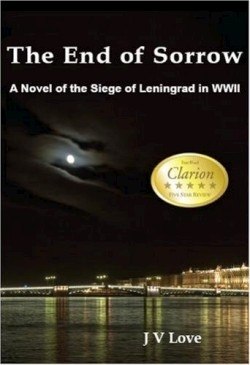The End of Sorrow
A Novel of the Siege of Leningrad in WWII
*The death of one man is a tragedy. The death of millions is a statistic. —*Joseph Stalin
One million people perished during the nine hundred day Siege of Leningrad but the city didn’t fall. This superb literary novel takes pains with historical facts and the details of daily living during the mass starvation but it transcends the merely good with evolutionary characters wholly fictional ones backed by real public figures. The End of Sorrow succeeds in revaluing the lives Stalin rationalized away.
The plight of the under-trained badly equipped Russian army and guerilla tactics of the behind-the-lines Partisans are described through Felix. Reluctantly separated from his fiancé he illustrates the shifting outlook of soldiers becoming accustomed to killing and hardship. Felix’s childhood friend Dima is a true-believing party ideologue an executor of enlisted deserters hated by those under his command unwilling to surrender ground to the advancing German army. Another character Petya has the tormented psyche of a Raskolnikov displaying increasingly irrational and paranoid ideation. A frustrated writer at the beginning Petya is jealous of the success of his neighbor Dmitry Shostakovich. The iconic composer is modest private and mildly dismayed by the Communist Party’s denunciation of his music as overly formalist.
The in-city story centers on Katya an unconflicted heroine who plans to marry if Felix returns from the Front. Her religious views (uncommon to profess in the Soviet era) including commitment to nonviolence and tolerance were transmitted from a dissident Mennonite grandmother. “But what if what people call evil is simply a result of men and women making bad decisions trying to get something they want?’” Katya’s moment of greatness comes when she alone prevents an unabsorbable cut in civilian food rationing at the personal expense of citywide employment blacklisting. As nutrition declines in Leningrad irrational behavior comes to the fore. Dreams the guidance of interior voices and the main protagonist’s prescience regarding who will soon be killed enrich the drama.
The classical Russian form lives on; this novel is no pale imitation. Author J. V. Love’s style clearly integrates aspects of Tolstoy and Dostoevsky. His audience doesn’t need explicit mentions of War and Peace and Crime and Punishment in order to conceptualize the links to those pillars. Some topical content subtly comments on today’s political mood showing that the natures of governments and wars are fairly static: “Nobody wanted to try to understand anyone else. Nobody was interested in the truth or honesty or good intentions. No matter the country leaders seemed to prey on people’s fears.”
The author is an alumnus of the Gotham Writers Workshop and a recently ordained Interfaith Minister. The latter informs existential discussion of the starving. Love salutes the resilient and honors the more fragile but stands far enough back to conceptualize a broader humanism. The End of Sorrow is a triumph of craft a rock-solid gratifying choice for discerning fans of serious literature.
Disclosure: This article is not an endorsement, but a review. The publisher of this book provided free copies of the book and paid a small fee to have their book reviewed by a professional reviewer. Foreword Reviews and Clarion Reviews make no guarantee that the publisher will receive a positive review. Foreword Magazine, Inc. is disclosing this in accordance with the Federal Trade Commission’s 16 CFR, Part 255.

